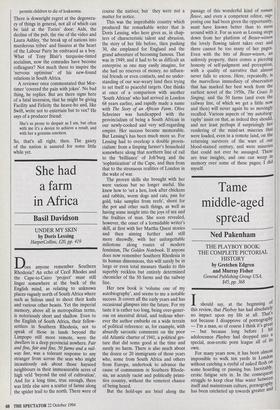She had a farm in Africa
Basil Davidson
UNDER MY SKIN by Doris Lessing HarperCollins, £20, pp. 419 Does anyone remember Southern Rhodesia? An echo of Cecil Rhodes and the Cape-to-Cairo `project' must still linger somewhere at the back of the English mind, as relating to unknown places vaguely north of South Africa where such as Selous used to shoot their kudu and various other beasts. Yet the imperial memory, above all in metropolitan terms, is notoriously short and shallow. Even to the English of South Africa, their fellow- settlers in Southern Rhodesia, not to speak of those in lands beyond the Limpopo still more remote, were the dwellers in a deep provincial nowhere. Fair and fine, fair and fine, 50 Pans and a rail- way line, was a tolerant response to any stranger from across the seas who might incautiously ask about those hayseed neighbours in their immeasurable acres of high veld 'beyond the end of cultivation'. And for a long time, true enough, there was little else save a scatter of farms along the spider trail to the north. There were of course the natives; but they were not a matter for notice.
This was the improbable country which produced the remarkable writer that is Doris Lessing, who here gives us, in chap- ters of characteristic talent and abrasion, the story of her life before, then pushing 30, she emplaned for England and the grand adventure of becoming famous. That was in 1949, and it had to be as difficult an enterprise as one may easily imagine, for she had no reserves of money, no influen- tial friends or even contacts, and no under- standing of our war-weary land then trying to set itself to peaceful targets. One thinks at once of a comparison with another `South African' who had arrived in London 68 years earlier, and rapidly made a name with The Story of an African Farm. Olive Schreiner was handicapped with the provincialism of being a South African in our newly-cooked and very self-regarding empire. Her success became memorable. But Lessing's has been much more so. For Lessing had to overleap a double provin- cialism: from a limping farmer's household somewhere along that northern line of rail to the 'brilliance' of Joh'burg and the `sophistication' of the Cape, and then from that to the strenuous realities of London in the wake of war.
The proven skills she brought with her were various but no longer useful. She knew how to 'set a hen, look after chickens and rabbits, worm dogs and cats, pan for gold, take samples from reefs', shoot for the pot and other such things, as well as having some insight into the joys of sex and the frailties of man. She soon revealed, however, the onset of a formidable writer's skill, at first with her Martha Quest stories and then aiming further and still more shrewdly, with her unforgettable milestone along routes of modern feminism, The Golden Notebook. If anyone does now remember Southern Rhodesia in its human dimensions, this will surely be in large or even total measure thanks to this superbly reckless but entirely determined chronicler of the 50 farms and the railway line.
Her new book is 'volume one of my autobiography', and seems to me a notable success. It covers all the early years and has occasional glimpses into the future. For my taste it is rather too long, being over-gener- ous on ancestral detail, and tedious wher- ever the author embarks on a wide terrain of political reference: as, for example, with absurdly sarcastic comments on the poor old Atlantic charter of 1941, a political ges- ture that did some good at the time and surely no harm. There is also much about the dozen or 20 immigrants of those years who, some from South Africa and others from Europe, undertook to advance the cause of communism in Southern Rhode- sia, an acutely racist and politically primi- tive country, without the remotest chance of being heard.
But the hold-ups are brief along the passage of this wonderful kind of roman fleuve, and even a competent editor, sup- posing one had been given the opportunity, must have known better than to mess around with it. For as soon as Lessing steps down from her platform of Besser-wissen the lovely flowing talent takes over and there cannot be too many of her pages. Even with the bits of Besser-wissen, an unlovely property, there comes a piercing honesty of self-judgment and perception, with a quality of narrative that almost never falls to excess. Here, repeatedly, is the marvellous immediacy of observation that has marked her best work from the earliest novel of the 1950s, The Grass Is Singing; and the 50 farms (and even the railway line, of which we get a little now and then) will never again be so movingly recalled. Various aspects of 'my autobiog- raphy' insist on that, as indeed they should, and not least perhaps if surprisingly her rendering of the mind-set miseries that were loaded, even in a remote land, on the returning survivors of the wars of our blood-stained century, and were miseries that could not ever be assuaged. These are true insights, and one can weep in memory over some of these pages; I did myself.










































































 Previous page
Previous page